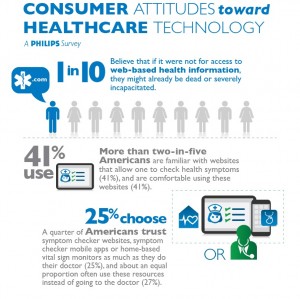 More than a third of American adults think self-monitoring is the key to living a longer life, according to a survey commissioned by Philips Healthcare and conducted by Opinion Research Corporation. The survey of 1,003 participants included questions about online symptom checking, home diagnosis, and self-monitoring, and the results showed a growing acceptance of and even reliance on these sorts of home health technologies.
More than a third of American adults think self-monitoring is the key to living a longer life, according to a survey commissioned by Philips Healthcare and conducted by Opinion Research Corporation. The survey of 1,003 participants included questions about online symptom checking, home diagnosis, and self-monitoring, and the results showed a growing acceptance of and even reliance on these sorts of home health technologies.
According to the survey, 41 percent of respondents said they were comfortable using symptom checking websites for home diagnostics and 49 percent were comfortable with symptom checkers and home vitals monitors automatically reporting information back to their doctors. In general, respondents were more likely to be comfortable with home vitals monitors than mobile apps when it comes to sharing data. A spokesperson from Philips told MobiHealthNews that 38 percent said they were comfortable with home monitors sharing their data versus 29 percent reporting the same about mobile apps.
A substantial number of Americans are turning to home health technologies as often as they turn to physicians for health information. A quarter of respondents said they trust symptom checkers and home-based diagnostic tools as much as they trust the doctor, and 27 percent said they use home tools instead of visiting the doctor. The survey also found that 28 percent of men trust symptom checker websites, symptom checker mobile apps or home-based vital sign monitors as much as they trust their doctor, compared with 21 percent of women.
One in 10 adults took it one step further, saying "they might already be dead or severely incapacitated" if it weren't for web-based health information.















